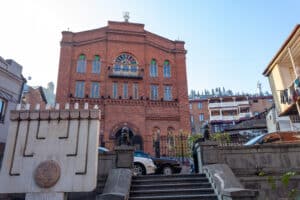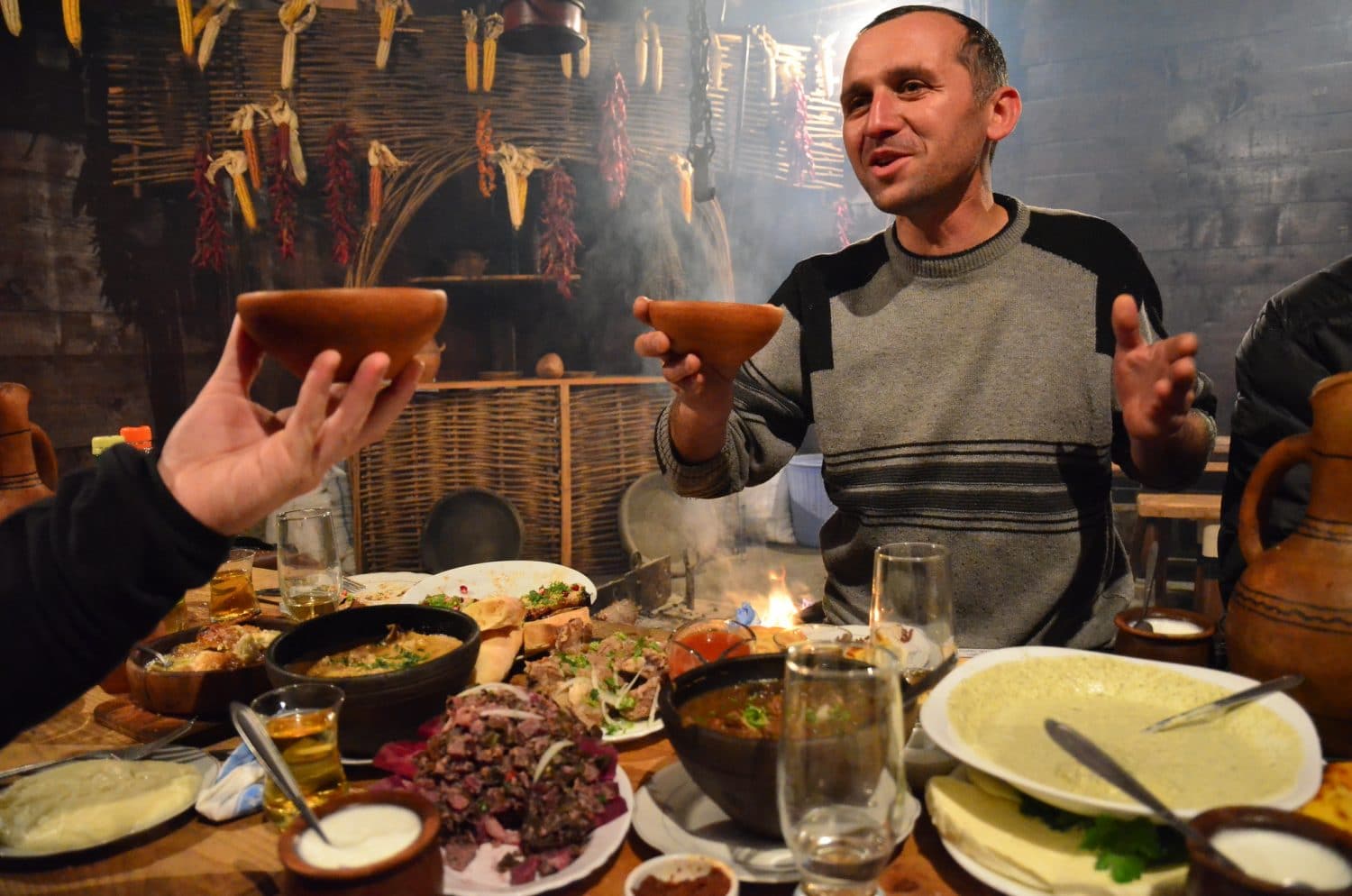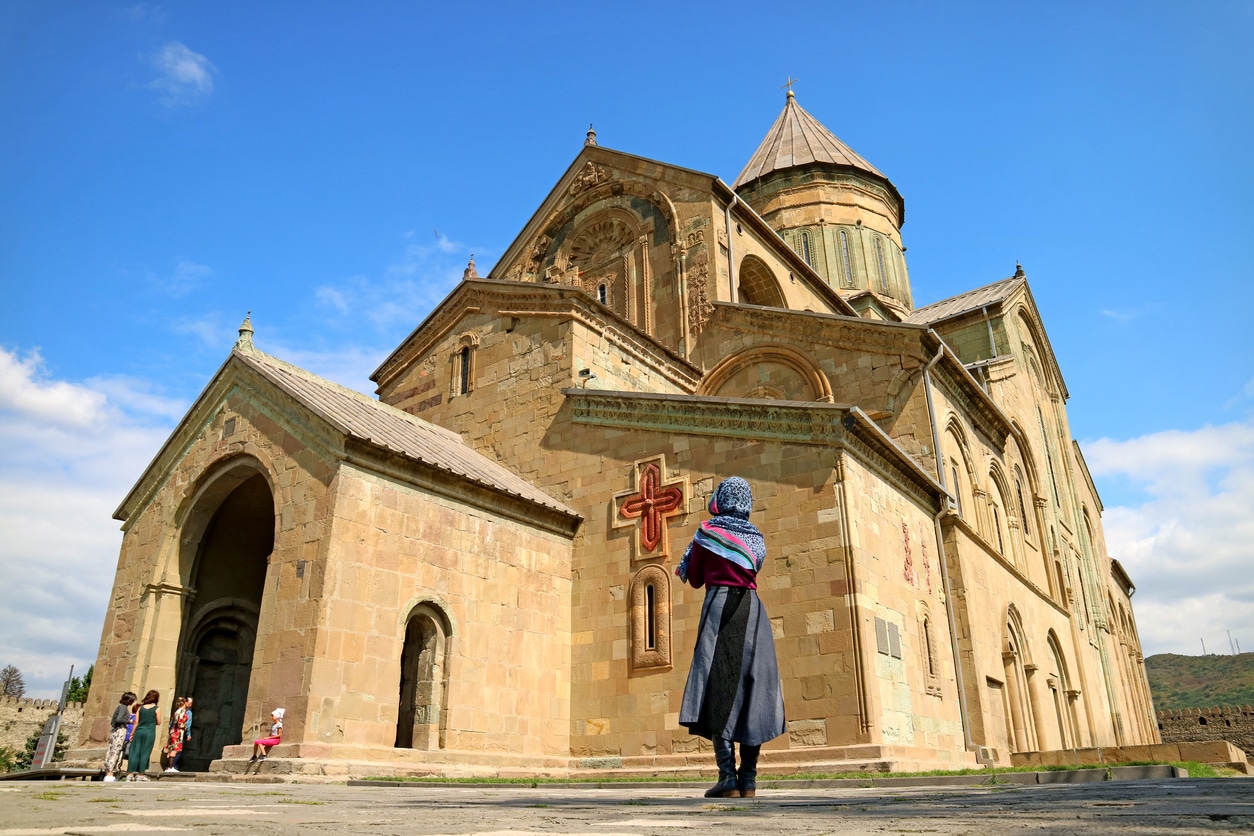This guide to travel in Georgia is tailored for Jewish-American university students preparing to study abroad in Georgia. We navigate the historical depth and modern vibrancy of Jewish life in this culturally rich country. Discover key historical sites, engage with local Jewish communities, and find practical tips on maintaining kosher practices and observing Shabbat while abroad.
SRAS thanks Nya Feinstein, whose research while serving an SRAS internship, consistituted the basis of most of this guide.
A Brief History of Jews in Georgia
Jews in Georgia today descend from two distinct groups: Georgian Jews and Ashkenazi Jews.
The first group, the Georgian Jews trace their presence in the region back to the 6th century BC, likely linked to the Babylonian exile. Their numbers were bolstered in the 1st century AD by Jewish refugees who fled Jerusalem during the Roman conquest and by Jews who fled Byzantine persecution in the 6th century. These Jews heavily integrated into Georgian society, speaking Georgian and/or a Judeo-Georgian dialect known locally as “Kivruli,” but also meticulously preserving their religious traditions in tight-knit families and communities.

Georgian Jews were generally peasants, craftsmen, and petty traders. While not rich, they were long-standing Georgian-speaking residents, and as such, they were generally accepted by their neighbors.
Ashkenazi Jews, in contrast, arrived in Georgia mainly during the 19th and 20th centuries, after the area was conquered by Russia. The Ashkenazis were fleeing persecution in Europe, including within Russia itself. There were also positive draws to the area, including growing economic opportunities, mild climate, and a long-standing Jewish population. For the arriving Ashkenazis, their cultural practices, Yiddish language, and origins from Germanic and Slavic lands marked them as district from the indigenous Georgian Jews. Both communities coexisted, but maintained separate identities. The Georgian Jews often regarded the Ashkenazis as too secular while the Ashkenazis regarded the Georgian Jews as shockingly conservative.
Under the Soviets, repression at home and the creation of Israel led to large numbers of Jews immigrating from Georgia in the “waves” of immigration that marked the later years of the USSR. Georgian Jews, who had maintained close families and communities, often migrated en masse, and the Jewish population of Georgia significantly decreased.
Today, a small, resilient communities of Georgian Jews and Ashkenazi Jews remain in Georgia, where they maintain their religious, cultural, and linguistic traditions. They are generally accepted by and integrated to the wider society, which is Christian by massive majority.
Traveling to Tbilisi
Soon, you will be arriving in a city that is not only the center of Jewish life in Georgia, but also one of the major historic sites of the Jewish Diaspora!
Georgian Jews have called Georgia – especially Tbilisi – home for approximately 2,600 years, making this one of the oldest Jewish communities in the world. Following Sephardic traditions, the origins of Georgian Jews is shrouded in mystery, though many agree that a group of Jews found themselves in Georgia in the 6th century after escaping Babylonian captivity. Also known as “Gurjim” or “Ebraeli”, Georgian Jews carry their unique identity and history with pride, identifying strongly with being both “Georgian” and “Jewish”. In fact, Judeo-Georgian, also called “Gruzinic” or “Kivruli” is a dialect of Georgian that was once used extensively by the Georgian Jewish population.
The Jewish community in Georgia grew considerably with the arrival of Ashkenazi Jews in the early 20th century, fleeing from the pogroms plaguing Eastern Europe. After the fall of the Soviet Union, however, most Jews in Georgia immigrated elsewhere, most notably Israel. The population of once around 120,000 Jews in Georgia with a synagogue in every populated area has now fallen to a mere few thousand with a handful of remaining synagogues, yet the attitude towards Jews remains markedly amicable. In fact, Georgia is a popular destination for tourists from Israel.
Tbilisi Synagogues and Chabad
There are several locations in Tbilisi for those interested in learning more about Jewish history in Georgia and Tbilisi as well as locations to attend services.

One of the two synagogues in the heart of Tbilisi, the Great Synagogue, sometimes referred to as the Georgian Synagogue, was built in the late 19th and early 20th centuries by Jews from Akhaltsihe. Visitors marvel at the breathtakingly beautifully detailed interior, complemented by an equally enthralling exterior.
The sister synagogue, known as the Little Synagogue, also known as the Ashkenazi Synagogue or Beit Rachel Synagogue, was originally built approximately two decades after the Great Synagogue. Destroyed in the earthquake of 1991, the building was rebuilt in 2009 with aid from the international Jewish community. While smaller and simpler than the Great Synagogue, this structure is still very much worth a visit, especially to the see the beautiful 150-year old Torah Arc in the lower hall.
The Chabad of Tbilisi is active and welcomes visits from travelers and locals alike.
David Baazov Museum

For a deeper look into history, visit the David Baazov Museum, which covers the history of the Jews of Georgia as well as Georgian-Jewish relations in general. Exhibits feature artifacts such as manuscripts, art, and photographs. The museum was established in 1932, in the name of Georgian-Jewish Rabbi David Baazov. An overarching goal of the museum is to show that Georgian Jews have positively helped shape Georgian history while holding fast to their identity and living in peace. The building’s design is inspired by synagogue architecture. However, both secular and religious artifacts are displayed to highlight the Georgian-Jewish multifaceted identity and shared history with all other Georgians.
Kosher Options in Tbilisi
Keeping kosher is different for each Jewish student, whether home or abroad. There are several options to optimize accessibility and affordability.
Firstly, students have reported following “kosher style”, or simply adhering to as many kosher rules as possible while still being able to eat well. For example, while every meal might not be certified kosher, one can try as best as possible to not mixing meat and dairy and to avoid pork and shellfish, for instance.

For students in accommodations that include a kitchen, the Chabad in Batumi has provided a list of Kosher foods commonly found in grocery stores throughout Georgia.
The Chabad of Tbilisi offers a kosher meal for Shabbat and holidays. Information for registration as well as further information for contact can be found on their website.
Tbilisi has four kosher restaurants. Mendi’s (also written as Mendy’s) is a meat establishment run in conjunction with the Chabad and has great reviews online. Next, Hummus Jerusalem Kosher is highly rated, affordable, and in a central location. The Kosher Restaurant David is well-known for providing traditional Georgian food in kosher options. Another option is the Jerusalem Kosher restaurant near the Grand Synagogue and known for its affordability.
Traveling to Batumi
Perched on the coast of the Black Sea, Batumi is alive with beauty, culture, and an active history spanning back over one thousand years.
Jewish history in the region began in the 16th century as Jewish merchants visited Batumi as a then-major trading port in the Ottoman empire. It wasn’t until the late 19th century, however, that the Jewish community grew significantly as Russian Jews appeared in Batumi after the Russian-Turkish war.
While the Jewish presence in Batumi has ebbed and flowed over the centuries, Jews in Batumi have left a significant impact on the city’s physical and historical landscape. Despite often facing persecution under the various empires that ruled Georgia, they played a significant part in developing the city’s economy, society, and in cultivating the arts there.
Today, Batumi still has a small but welcoming Jewish community. Jews in Batumi live in peace, surrounded by reminders located around the city of Batumi’s Jewish history, such as the synagogue and Jewish Quarter. In fact, Batumi is a popular site for Israeli tourists!
Batumi Synagogue and Chabad

Completed in 1904, The beautiful Batumi Synagogue was originally known as the Ashkenazi Synagogue, built by Ashkenazi Jews. It was in service until 1923, when it was closed by the Soviet authorities. Six years later, it was repurposed by the Soviet government as a sports hall. In 1993, the synagogue was given back to Batumi’s Jewish community. In 1998, the Batumi Synagogue was reopened and again became an active place of worship and the heart of the Jewish life in the city. The synagogue also now has cultural heritage status from the Georgian state, giving it special protection. The synagogue is currently active with Shabbat and holiday services.
The Chabad of Batumi is active and welcomes visits from travelers and locals alike.
Batumi Jewish Quarter

Founded in the 19th century, the area surrounding the synagogue – the Jewish quarter of Batumi – was once the heart of everyday Jewish life. This area was then the economic heart of the city – populated by merchants, skilled artisans, as well as bankers and financiers. Members of the powerful Rothschilds family lived here – they were instrumental in developing the rail, port, and refinery infrastructure in the city. Their house still stands at 39 Rustavali Ave. True to the geocultural context, the architecture of the Jewish Quarter is made unique by interwoven themes reminiscent of both the Ottoman and Russian influence.
Kosher Options in Batumi
Keeping kosher while traveling can be difficult. Some students choose to follow “kosher style,” consisting of adhering to as many kosher rules as possible while still being able to eat affordably and conveniently. For example, while one might not eat certified kosher meals, one can still refuse pork and shellfish and try to not mix meat and dairy.
Batumi Chabad hosts a weekly Shabbat dinner. It costs about $30 and you can register for it on the group’s website.
Batumi also has a few kosher restaurants. Affiliated with the Chabad is a kosher meat restaurant, Mendi’s. Another restaurant is the Kohelet Kosher Restaurant (also meat). Finally, Haba-Eat is a vegan Israeli restaurant.
If your living arrangement includes a kitchen, the Batumi Chabad also provides a list of kosher foods commonly found in local grocery stores.
Keeping Shabbat in Georgia
While keeping Shabbat may look different for each Jewish student – both at home and abroad – there are many accommodations for any level of observation. Students report any key location being within walking distance and the streets to be exceedingly safe.
In some lodgings, there is a physical key available to avoid usage of a keypad on Shabbat. Students on homestays have reported very positive experiences with families that have proven flexible and accommodating.
SRAS programs included cultural programs with excursions that are often held on weekends. However, even during busy weekends, students find ways to comfortably observe shabbat, such as bringing materials (such as candles) and communicating their needs with instructors in advance.
Antisemitism and Acceptance
Though Georgia has a rich Jewish history, antisemitism and far right movements do exist here. That said, Georgia is considered a safe location for Jewish travel and the vast majority of Georgians take pride in their long traditions of hospitality and welcoming all with open arms. There is no need to hide your identity here and openly wearing Jewish symbols and clothing is accepted. Just take the same general safety precautions that anyone would need to take when visiting a major city. In short, while you are just as likely to see passing evidence of antisemitism in Georgia as you are anywhere else, students who have visited Georgia have reported an overwhelmingly positive experience.
Before Your Trip
Before you go, here are a few tips from previous Jewish students who have stayed in Georgia:
- If you plan on visiting the Batumi Chabad or Tbilisi Chabad, send an email or text to the Rabbi before arrival to ask any questions and clarify details for your visit.
- Communicate with SRAS, your instructors, and guides to discuss accommodations for Shabbat, meals, and any other concerns.
- Attend all SRAS briefings and always research the history and peruse news sources about any destination you travel to. This will help you learn more from it and keep yourself safe.
Safe travels, and enjoy your time in Georgia!
Staying Kosher in Georgian Homestays
This last section was written by guest author Marina Garfield, a Jewish student from the University of Texas at Austin who studied with SRAS in Georgia over the summer of 2023.
Most students studying in Georgia with SRAS stay with homestay families. Thus, I had to explain my dietary restrictions to them so that I could observe these restrictions while living with my homestay family. When I am staying with someone who isn’t Jewish, I usually try to send a introductory message before I meet them and but also try to make sure that I patiently explain things once I get there as many will not fully understand restrictions and everyone’s restrictions tend to be personal in how they are observed.
I usually send over a small paragraph like this, which can be easily edited as my levels of observation change.
- I keep kosher, which, for me means that I don’t eat any treif food (specifically forbidden food like pork, shellfish, oysters, etc.) or any foods made with derivatives of treif food (gelatin (although fish gelatin and pectin are okay), oyster sauce, lard, etc.). However, I will eat meat (beef and chicken) that has not been Kosher-certified. I also do not mix meat and dairy, and won’t eat dairy w/in 6 hours of eating meat. For example, I wouldn’t really eat a sandwich with meat and then follow it with a glass of milk, but the other way around is okay. Also, I am not comfortable removing meat from a dish (ex: removing meat from a pizza to eat it, or removing pieces of bacon from a salad.) I am okay if the food I eat is made in the same pan after treif food was cooked, as long as I don’t know about it. Sometimes I am flexible with this, if need be.
Sometimes host families can struggle to understand why someone would want to follow a dietary restriction. Sometimes this can be difficult for students to cope with, since so many people in the US are quickly accepting and accommodating to dietary restrictions. However, it was important for me to remind myself that just because someone does not understand my dietary restrictions at first does not mean that they are malicious. Instead, it is best to face these situations with patience, using the experience to learn about cross-cultural exchanges. That being said, here are some phrases I have used to facilitate a conversation about religious dietary restrictions:
- “It may be easier to think of these restrictions like an allergy.” – Even if the concept of a religious dietary restriction is something new, almost everyone knows someone who has an allergy. Allergies are also very serious, so this comparison adds some weight to the importance of respecting a kosher diet.
- “What are some foods that you would not feel comfortable eating?” – Sometimes a conversation about food preferences between a host family and a student can create a closeness. Rather than just rattling off foods that one can’t eat, it becomes more like a chat.
- “This is how I cook for myself at home” – To some people, certain dishes seem unimaginable without mixing meat and dairy. By providing a host family about the ways I overcome my dietary restrictions at home, they can get a more realistic understanding of what cooking kosher looks like. For example, I have had host families who could not comprehend what borscht without meat looks like. By sharing the way I cook borscht (with vegetable stock), they were able to recreate a similar experience for me.
Of course, reaching out to you SRAS program coordinator is always an option if the host family is not understanding the seriousness of your dietary restriction.
You’ll Also Love

8,000 Years of Winemaking Lives On in Georgia
Georgia is home to one of the world’s most diverse selections of native grape varieties. Evidence suggests it’s the oldest winemaking region in the world and it retains unique and ancient winemaking technologies to this day. Over millennia, winemaking has become deeply integrated into Georgian cuisine, tradition, and identity. It is present at elaborate feasts […]

Tarkhun: An Incredible, Natural Soda from Georgia
Tarkhun (тархун) is a carbonated soft drink made from tarragon leaves. The drink is known for its typically distinctive green color and is especially popular in Russia and the Caucasus. Tarkhun was first concocted, like most western sodas, by a pharmacist. Mitrofan Lagidze, a Georgian, first mixed carbonated water with his original tarragon syrup in […]

Georgian Nutrition: A Tasty Way to Good Health
As a nutritionist, food is often the driving factor of my travels. I love exploring the local and traditional cuisines which help shape the identity of a country. Georgian culture is strongly influenced by, and perhaps best known for, its unique and vibrant cuisine. Georgian cuisine in Georgia is packed with fresh and organic produce […]

Mariamoba, Svetitskhoveli, and Giorgoba: Holidays that Reflect Georgia’s Soul
Georgia’s three main autumn holidays, Mariamoba, Svetitskhoveli, and Giorgoba, are a great window to experience the soul of the Georgian people. Each of these state holidays represent a different aspect of Georgia’s unique religious tradition which has developed over the last millennia. Celebrations are well attended and important to Georgians. As a way to fully […]

Pkhali – The Healthy Georgian Pâté
Pkhali (пхали in Russian; ფხალიin in Georgian), made from finely chopped and cooked vegetables mixed with spicy walnut sauce, is one of the most popular traditional Georgian dishes. It is usually garnished with pomegranate seeds and sometimes served alongside eggplant rolls that also feature spicy walnut filling. Almost any vegetable can be used to make […]





